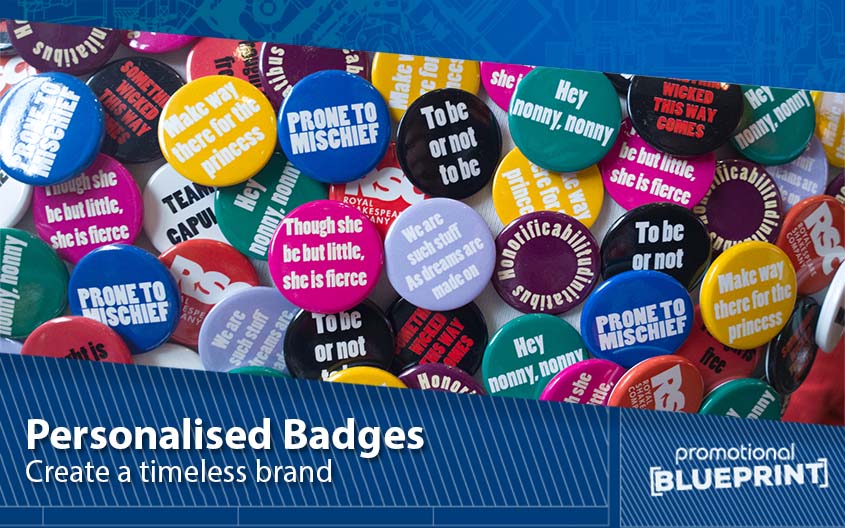
There is nothing more nostalgic than unearthing an old collection of playing cards, old coins and badges. These sentimental knickknacks played a huge role in many people’s childhoods and represented a treasured hobby they enjoyed. Plus, depending on what they’re made of, they could also be extremely valuable.
Personalised badges, in particular, were once valued gifts people received on special occasions. They were a standard method of commemorating various holidays or events of national importance. However, because of the rise of electronic currency and paper money, people are no longer interested in investing in costly, hand-crafted badges.
But that doesn’t mean they’re obsolete. Even basic 30mm steel pin badges are durable, high-value accessories people pin on their chests or on their backpacks. This means they’re highly visible items that capture the attention and start conversations. And that is exactly what a brand needs to generate exposure.
Not to mention that they evoke positive feelings in the recipient. Badges were peak 60s and 70s fashion accessories, as every hippy and old-school rocker knows. Therefore, they can play up on those nostalgic heartstrings like no other and add a retro flair to any company’s marketing campaign.
Pinning Down the History of Badges
For many people, badges may be synonymous with the hippy movement. However, their history stretches much further than the last few decades. One of the first recorded instances of badges dates back to the Middle Ages, where they served as a means of identification.
Mediaeval knights wore a coat of arms over their armour to signify their rank and the lord they served. Likewise, soldiers and other government officials carried around badges to symbolise their authority, as well as broadcast their accomplishments to the world.
This idea of using badges to signify interests and achievements passed into the 19th century. During this time, American inventor John Wesley Hyatt started covering up billiard balls with collodion, a derivative of cellulose nitrate. Manufacturers would then lay a sheet of paper over the celluloid to make the material resemble enamel. Lastly, Hyatt attached pins to the back of the badges, removing the need to carry them around on heavy chains.
Thus, modern pin badges were born. This simple accessory has been a convenient way for people to communicate their opinions, or showcase their support for various social and political causes. However, by the time the 60s hippy craze rolled around, people started using badges to signify other interests, too, like their favourite music. Though badges aren’t as popular as they used to be, they’re still a neat blast from the past — especially for those who treasure the 60s counterculture movement and still rock a vintage style.
Custom Badges — An Advertiser’s Dream
There were several reasons people used custom badges in the past. For one, they’re usually smelted using heavy-duty metals. Therefore, there is little chance they would break, even under extreme pressure. Secondly, since they usually sported exquisite craftsmanship, they were highly visible. So, they represented a convenient way for authority figures to proclaim their position to the people around them.
These are just one of the many reasons badges make for excellent promotional products — particularly for a company looking to stand out among the competition.
1. They Create a Sense of Belonging
Before the days of the internet, people often used badges to start conversations and connect with like-minded individuals at various social events. In a corporate environment, badges play a similar role. They identify company employees and clearly outline their role in the business. Plus, they can act as an extension of the company uniform, thus generating a sense of community and shared interest.
2. They Can Be a High-Value Gift
Granted, a printed button badge doesn’t make for an impressive promotional gift. However, badges come in many shapes and sizes, and companies can customise them to up their perceived value. For example, they can opt for custom enamel badges instead of plastic ones.
Likewise, they can have their logo engraved on the front to give the pin that sleek, polished look. If the marketing campaign is centred around vintage themes, then making the badges look like old-timey medallions or coins could do wonders to increase their appeal. However, even if a brand opts for a more modern aesthetic, the badges can still count as a high-value gift for business partners and clients alike.
3. They Can Last for Years
The true beauty of custom badges is their longevity. Depending on the materials and the craftsmanship quality, a badge can last for several years. During this time, they can continuously give a brand repeated exposure, long after the original marketing campaign is over.
Furthermore, they’re suitable for all types of occasions. Brands can hand them out during fundraisers as a thank you to everyone who donated to their cause. Similarly, they can hand out the pins to spread awareness about important social issues. That way, a brand can build up its image while also supporting good causes in meaningful ways.
Related content:
What Makes Printed Badges Effective Promotional Giveaways
To Wrap Up
Clothes mark an individual’s personal style, but accessories are what truly complete a look. And there is no better way to express one’s individual style than with a set of custom badges. They’re timeless vintage accessories that fit all occasions. Plus, they can increase brand awareness like it’s nobody’s business! Since they’re highly visible and easy to customise, badges are the ultimate promotional companion for any company looking to capitalise on nostalgia.
You may also like:
Printed Fridge Magnets – Paragons of Excellent Marketing
Check out our full collection of custom printed novelties which includes stickers, magnets, and message bugs. If you require further information or have any specific questions, don’t hesitate to give a member of our experienced team a call on 0800 0148 970 or simply email us today.






